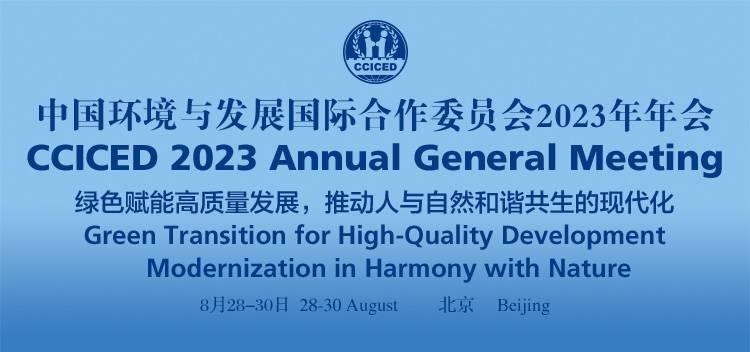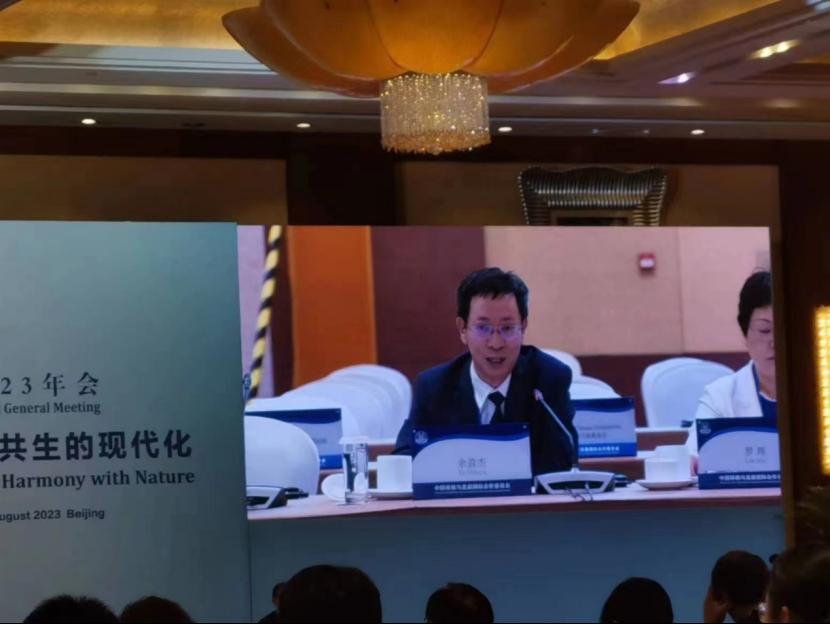Time:2023-08-31 Source: Author: Views:
On August 28, the 2023 Annual General Meeting of China Council for International Cooperation on Environment and Development (hereinafter referred to as CCICED) kicked off in Beijing, with this annual meeting’s theme this time being “Green Transition for High-Quality Development Modernization in Harmony with Nature.” The next day on August 29, Professor Yu Miaojie (Deputy to the National People's Congress, Deputy Secretary of the Party Committee, and President of Liaoning University) was invited to attend the Expert Policy Dialogue of CCICED 2023 Annual General Meeting, where he delivered a speech.

Professor Yu, representing the Chinese leader for the thematic policy research on trade and sustainable supply chain of CCICED, made a speech in English on behalf of China's position. He said that China, being the largest trading country, has always stayed committed to ecological protection and shouldered the responsibility of global trade and green transformation of supply chains. On the import side, China imports a lot of agricultural products, such as soybeans and palm oil. Producing these imported agricultural products consumes a lot of land, which also leads to forest destruction and affects the global process of controlling greenhouse gases. On the export side, the team led by Professor Yu used the World Input-Output Table (WIOD) to calculate the carbon emissions of China's exports. In terms of total amount, the top three industries of China’s exports of carbon emissions are computer electronic products (4.05 million tons), power equipment (2.95 million tons), and textile products (2.47 million tons). In terms of unit strength, the furniture industry (71 tons/10,000 USD) is the export industry with the highest unit strength. Further calculation indicates that every 10% increase in coal price will lead to a 1.3% decrease in carbon emissions from industrial exports.

Next, Professor Yu put forward suggestions based on the research results. On the one hand, he emphasized, we should give play to price mechanism and eliminate backward production capacity to reduce carbon emissions; on the other hand, we should as a responsible government reduce coal mining and utilize the production end, vigorously developing new energies. As participants in international trade, Professor Yu continued, exporters and importers share a common responsibility in reducing carbon and emissions. Finally, in the era of digital economy, we should further play the role of data in energy conservation and emission reduction, doing more quantitative research to contribute to our ecological environment protection.
More than 200 people attended the meeting, including Lambertini, International Special Envoy of WWF; Dasgupta, President and CEO of World Resources Institute; Winther, Specialist Director of the Norwegian Polar Institute; Chinese and foreign representatives of the policy research project team of CCICED; representatives of the CCICED secretariat; and the international support office of the secretariat.
Chongshan Campus: No. 66, Chongshan Middle Road, Huanggu District, Shenyang Postcode: 110036
Puhe Campus: No. 58, Daoyi South Street, Shenbei New District, Shenyang Postcode: 110136
Wusheng Campus: No. 38 Youth Street, Baita District, Liaoyang City Zip code: 111000
Copyright by Liaoning University, Shenyang, China
